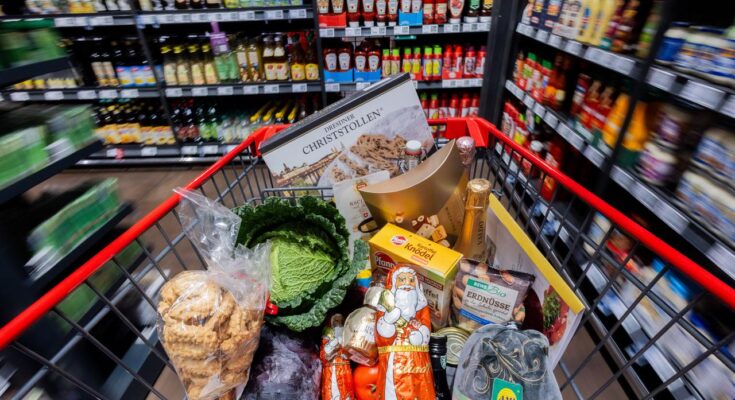Food prices have increased significantly in recent years. The Monopolies Commission concluded that the winner was food trade.
This may have something to do with market forces. In 2014, a liter of milk in supermarkets cost 70 cents, according to figures from the Monopolies Commission. 40 cents of which is given to farmers. In 2023, a liter of milk will cost 1.05 euros. But 40 cents is still given to farmers. In other words: Consumers have to pay much more at the supermarket checkout – but producers, namely farmers, don’t have it.
The price comparison for milk is drastic, said Tomaso Duso, chairman of the Monopolies Commission. But this points to a fundamental problem: “Everything points to a weakening of the competitive situation along the food supply chain in Germany. And we consider it problematic,” Duso said today at the presentation of the special report “Competition in the food supply chain”.
Increased dealer margins
In a 287-page study, the Monopolies Commission found increasing market concentration in the food retail sector. The dominance of the big four – Edeka, REWE, Aldi and the Schwarz Group alongside Lidl and Kaufland – has continued to grow over the years. From a 67 percent share of sales in 2000 to 87 percent in 2023. In other words: only 13 percent of sales remain in the food trade to smaller competitors.
This has consequences: the Monopolies Commission points to an increase in the profit margins of supermarket chains. And also prices in Germany have risen more sharply than in other EU countries. An indication that retailers’ market power is also hurting customers.
Federal Cartel Office should take a closer look
However, there are also external factors behind the increase in food prices, such as rising prices on the world market or rising energy prices. However, it is clear that when prices at the producer level rise, this will be immediately reflected at supermarket checkouts, Duso said. “If farmer prices fall, the price decline will not fully occur in the following stages and will occur much more slowly.”
Rupprecht Podszun of the Monopolies Commission recommended that the Federal Cartel Office take a closer look and apply existing rules more efficiently. In addition, procedures are required by authorities independent of suspicion and the right to act representatively. “Farmers, already under pressure from their processors, do not go to the Federal Cartel Office when in doubt and do not defend themselves in court.”
The Monopolies Commission also recommended stronger merger controls in the industry in the future. “We see little room for possible mergers in the food retail sector in Germany,” stressed Podszun.
Acquisition influence competition
From the committee’s perspective, Edeka’s takeover of Kaiser’s Tengelmann in 2017 in particular significantly damaged the competition. From the Monopolies Commission’s perspective, the food industry also needs greater attention. With the increasing number of brands owned, supermarkets will also become increasingly important in food production and further strengthen their market power over farmers.
However, the Commission did not go further by calling for the four major countries to separate or implement price controls. “We are very interested in pragmatic proposals and not in ever-expanding bureaucracy,” said Constanze Buchheim of the Monopolies Commission. “In practice, this will pose tremendous challenges.”
Edeka’s takeover of Tengelmann Kaiser had a major impact.
The trade association rejected the criticism
The Monopolies Commission, as an independent advisory body to the federal government, can only make recommendations – unlike the Federal Cartel Office, which is responsible for competition oversight and can also prohibit mergers. From Oxfam Germany’s point of view, the authorities should consider separating the industry. Because consumers and agriculture will suffer the consequences due to lack of competition.
German trade associations, on the other hand, point to the high costs of energy, personnel and purchasing goods, leading to higher food prices. In contrast to the Monopoly Commission, industry associations believe that competition works.




